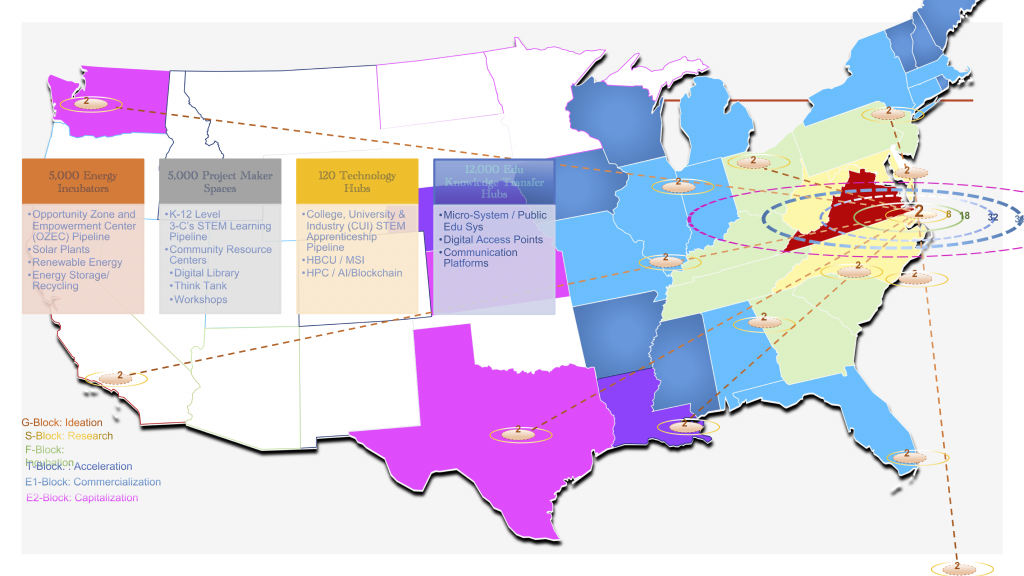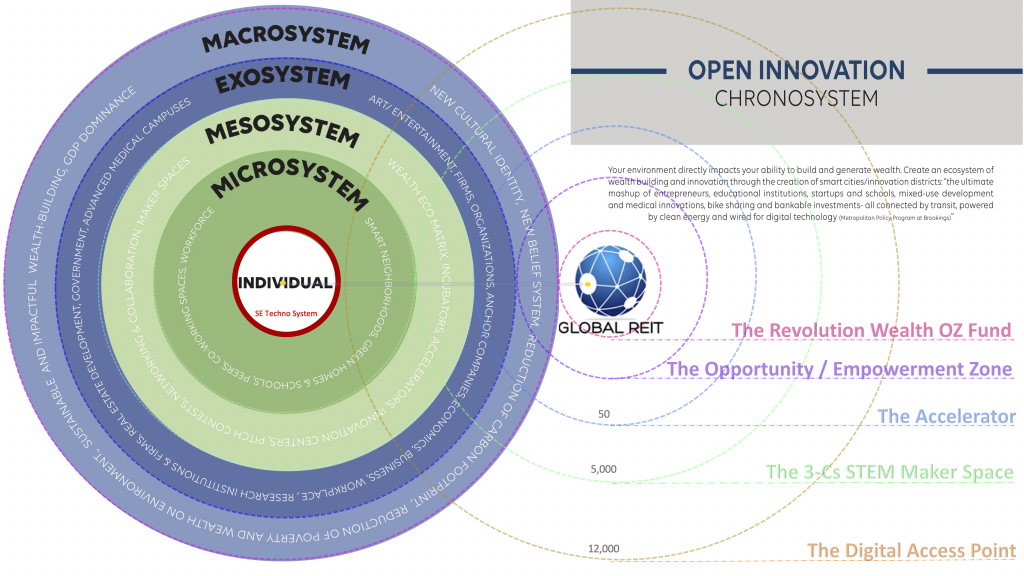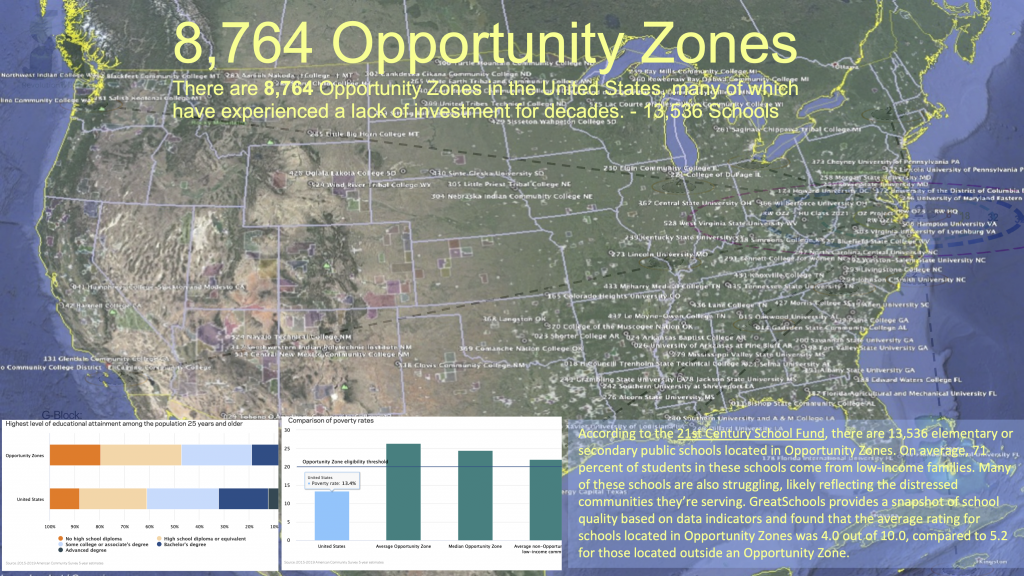Community Development Entity (CDE) Network
Introduction
Over the last four years, USD 5 Billion was awarded to create or enhance 102 Community Development Entities (CDEs). Our aim is to integrate the CDE Model to be owned and accessed by all underserved communities.

To integrate the “5,000 CDEs” with the Wealth Ecology Model, we propose establishing a Community Development Entity (CDE) Network. This network will be supported by the Revolution Wealth OZ Fund, UNCF, and the HBCU network, aiming to intersect the community at the middle school graduate level and implement the Wealth Ecology Model framework.
Objectives
Educational Empowerment: Enhance educational outcomes by providing resources and opportunities for middle school graduates.
Economic Development: Foster local economic growth through small business support, workforce training, and entrepreneurship.
Community Revitalization: Implement sustainable community projects focusing on housing, health, and cultural heritage.
Wealth Ecology Model Integration: Embed principles of the Wealth Ecology Model to promote ethical decision-making, community engagement, and sustainable development.
Revolution Wealth Opportunity Zone (OZ) Fund
The Revolution Wealth OZ Fund is a $5 billion fund comprised of Private Equity General Partners (GP) and 120 HBCU/MSI Limited Partners (LP). The objectives of the fund are:
- Increase HBCU endowments to $1 billion each.
- Monetize HBCU campuses and anchor institutions.
- Create 32,000 scalable STEM entrepreneur firms by 2030.
- Integrate 5,000 Community AccessPoints/CDEs.
CDE Network Structure
Central Coordination Hub
- Headquarters: Based in Las Vegas, Nevada, within the Historic Westside neighborhood.
- Leadership: Governed by a board comprising representatives from the Revolution Wealth OZ Fund, UNCF, HBCUs, and local community leaders.
- Functions: Strategic planning, resource allocation, partnership development, and oversight of regional CDE operations.
Regional CDE Offices
- Locations: Placed strategically in Opportunity Zones across the United States, particularly in areas with significant middle school graduate populations.
- Leadership: Managed by local directors with support from HBCU faculty and community stakeholders.
- Functions: Implementation of educational programs, economic development initiatives, and community projects.
Key Components and Programs
Educational Programs
- Middle School Transition Support: Provide resources and mentorship to help middle school graduates transition to high school.
- HBCU Collaboration: Develop pipeline programs that connect middle school graduates with HBCUs, offering scholarships, summer programs, and early college credits.
- STEM and Entrepreneurship Training: Implement after-school and summer programs focused on STEM education and entrepreneurial skills.

Economic Development Initiatives
- Small Business Incubators: Establish incubators to support local entrepreneurs, offering training, funding, and mentorship.
- Workforce Training Centers: Partner with local businesses and industries to provide job training and placement services for high-demand sectors.
- Microfinance Programs: Provide microloans and financial literacy training to help residents start and grow small businesses.
Community Revitalization Projects
- Affordable Housing Development: Work with local governments and developers to build and rehabilitate affordable housing units.
- Health and Wellness Centers: Establish centers providing comprehensive healthcare services, including mental health support and wellness programs.
- Cultural Heritage Initiatives: Support projects that celebrate and preserve the cultural heritage of the Historic Westside, including museums, theaters, and community festivals.
Wealth Ecology Model Integration
- Ethical Decision-Making Workshops: Conduct workshops and seminars on ethical decision-making and community leadership based on the Wealth Ecology Model.
- Sustainable Development Projects: Implement green infrastructure projects, such as community gardens, renewable energy installations, and sustainable transportation systems.
- Community Engagement Platforms: Create forums and platforms for community members to participate in decision-making processes and share their insights and feedback.

Implementation Plan
Phase 1: Planning and Establishment (Year 1)
- Establish the Central Coordination Hub in Las Vegas.
- Form the governing board and hire key staff.
- Identify and secure funding from the Revolution Wealth OZ Fund and other sources.
- Develop partnerships with UNCF, HBCUs, and local stakeholders.
- Launch pilot programs in selected Opportunity Zones.
Phase 2: Expansion and Scaling (Years 2-3)
- Expand the network to additional regions, focusing on high-impact Opportunity Zones.
- Scale up educational programs and economic development initiatives.
- Continuously evaluate and refine programs based on community feedback and performance metrics.
Phase 3: Consolidation and Sustainability (Years 4-5)
- Consolidate successful programs and ensure their sustainability.
- Strengthen community engagement and leadership development.
- Foster long-term partnerships and secure additional funding sources.
Leveraging Las Vegas Ecosystem
Using insights from the Las Vegas Ecosystem Mapping Report, the CDE Network will:
- Identify Gaps and Needs: Use the report’s findings to understand the specific challenges and opportunities faced by underrepresented founders in Las Vegas.
- Resource Mapping: Align available resources, such as incubators, accelerators, and mentorship programs, with the needs of the target community.
- Stakeholder Collaboration: Engage with key stakeholders identified in the report, including service providers, investors, and educational institutions, to build a supportive ecosystem.
- Impact Measurement: Develop metrics to evaluate the social and economic impact of the CDE Network’s activities, ensuring alignment with community goals and the Wealth Ecology Model.
Conclusion
The proposed CDE Network aims to integrate the “Hundred Plan in Action” with the Wealth Ecology Model, leveraging the support of the Revolution Wealth OZ Fund, UNCF, and the HBCU network. By focusing on educational empowerment, economic development, and community revitalization, this initiative will create a sustainable and thriving Historic Westside and beyond, fostering a new era of community-led growth and development.
Prepared by Dr. Oliver Jones
SourceEnergy Group R&D